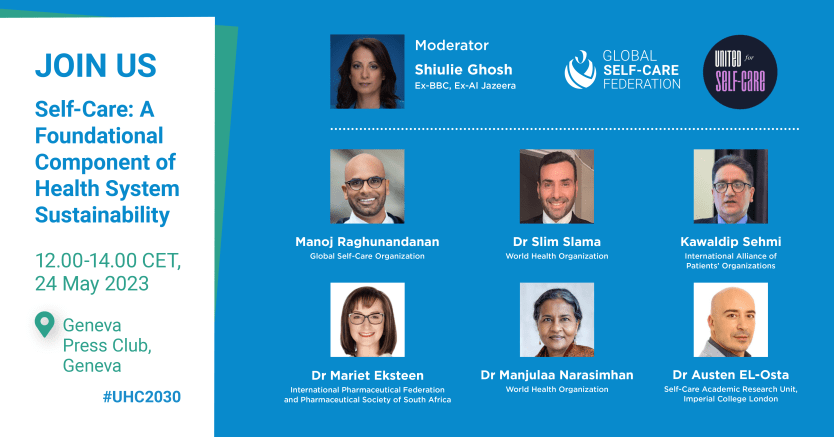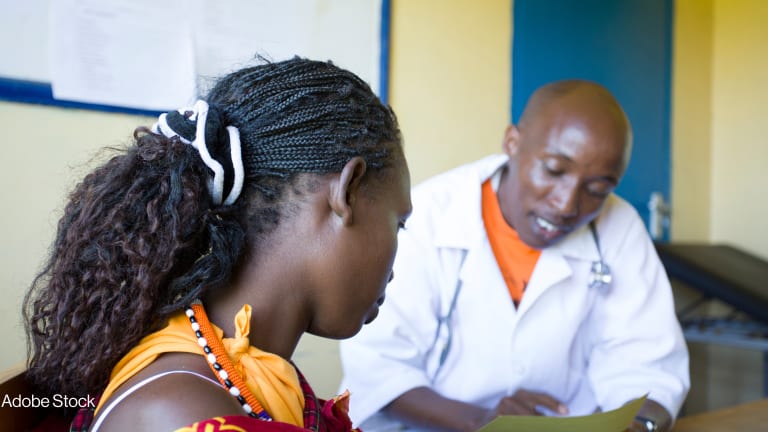
Self-care is not a new concept. Yet the discourse around it has grown and evolved over the past few years, and its importance has become more widely recognized. There are vast research and development opportunities that we could explore to make self-care more accessible to people throughout their lives and in different settings.
The body of evidence in favor of including self-care as a key component of national and international health policy is ever-growing. Many countries have already begun to do this by developing self-care blueprints and national strategies. To achieve universal health coverage, we need to include self-care as a cross-cutting theme to inform how people think about their own health and well-being journey and how health care and services are positioned in the future. Both providers and patients need robust systems that support them and their needs.
Collaborative work is needed to deliver five key objectives to succeed in integrating self-care into policy and eventually into practice:
1. Raise self-care literacy levels — such as awareness of the Seven Pillars of Self-Care — in people from all walks of life and throughout their life course.
2. Articulate self-care in a way that makes sense and is complementary to both local and national health systems and processes.
3. Embed self-care training as a core component of education, health, and social care.
4. Engage a broad range of stakeholders, including patients, health care providers, policymakers, and civil society organizations to ensure their needs and perspectives are considered.
5. Build the capacity of health care providers, community health workers, and beneficiaries — the individuals and patients — to effectively recommend and streamline access to self-care interventions.
As we strive to develop policies and guidelines that support the integration of self-care into national health systems, we could look to improve how we engage health care professionals and society with self-care. This can be achieved through training and capacity building, the development of quality standards, and ways of enlacing health care and service delivery models.
Self-care: A foundational component of health system sustainability — a WHA side event — will take place on May 24 at 12-2 p.m. CEST at the Geneva Press Club, in Geneva. It will bring together policymakers, health care providers, academics, and patient advocates to discuss strategies for advancing health equity by integrating self-care into national health systems. Speakers include representatives from WHO, Global Self-Care Federation, International Alliance of Patients’ Organizations, and SCARU. Please register to join in person or watch the live stream.
Inevitably, the inclusion of self-care into national health policies and systems translates into helping people feel more empowered and able to live happier and healthier lives by increasing autonomy and choice. This is why a wide mix of stakeholders are working together to help democratize access to self-care tools, products, services, and interventions. A refocus on the virtues of empowerment and self-care can be regarded as the first important step to helping achieve UHC and ensuring health and well-being for all.
Moving the needle on self-care policy and practice
It is exciting to witness the growing movement for self-care in the United Kingdom and internationally. As we look to the future, the resolution proposed by the United for Self-Care Coalition could pave the way for a World Health Organization resolution on self-care. For this to happen, we could draw from international best practice examples, including Australia's national policy blueprint for self-care which was highlighted in the Self Care Readiness Index 2.0.
We can also draw from Realising the Potential: A Blueprint for Self-care Strategy in England, spearheaded by the Proprietary Association of Great Britain, the U.K.'s consumer health care association. This policy initiative highlights how the COVID-19 pandemic affected health systems and communities and reiterates the case for self-care to promote health and well-being. The proposed self-care strategy includes a 10-year vision and is rightly ambitious, emphasizing the importance of self-care for the long-term future of the English National Health Service — which to date is the most loved institution in Britain. The blueprint recognizes the importance of self-care in everyday life and calls upon the government to adopt a strategy of self-care oriented to complement existing preventative health measures and as a means of improving long-term health outcomes. This could be largely achieved by focusing on the following nine key priorities:
1. Address inequalities in health literacy.
2. Enhance the national curriculum on self-care for primary and secondary-age children.
3. Introduce self-care modules in health care professionals’ training curricula and continuing professional development.
4. Make the best use of and expand the Community Pharmacist Consultation Service.
5. Improve access to effective treatments.
6. Enable community pharmacists to refer people directly to other health care professionals.
7. Ensure better support for primary care networks to deliver self-care.
8. Evaluate the use of technologies that have been developed during the COVID-19 pandemic to promote greater self-care.
9. Accelerate efforts to enable community pharmacists to populate medical records.
On May 10, the U.K. government and NHS England published a delivery plan for recovering access to primary care that takes action on eight of the recommendations in the blueprint. This is a huge success for self-care. Furthermore, in support of this strategy, the Self-Care Academic Research Unit, or SCARU, is advocating for more funding to be made available to progress key self-care research and development priorities, including initiatives that consider how to democratize access to self-care interventions throughout the life course and in different settings.

What’s next?
The real-world examples highlighted above were only made possible by collaborative working between a wide mix of stakeholders, including program managers, policymakers, professional bodies, patient groups, trade associations, clinicians, commissioners of health and well-being, pharmacists, and manufacturers of self-care products and services. Developing a multistakeholder platform where all participants, from governments to individuals in the community, can come together and have a voice is crucial. This year’s World Health Assembly offers the opportunity to do just that: the United for Self-Care Coalition is hosting Self-care: A foundational component of health system sustainability, a WHA side event on May 24 to highlight why a WHO resolution on self-care is key to achieving UHC. The event offers an excellent opportunity for anyone to listen in and engage with a wide variety of stakeholders to drive policy discussions.
Conversations such as these will continue to highlight the important role self-care can bring to individuals and health systems. It will be critical in the journey to advance a WHO resolution on self-care — and eventually to achieve UHC.
If you intend to attend the WHA side event Self-care: A foundational component of health system sustainability in person, register here. Alternatively, you can watch the livestream of the event through this link.








